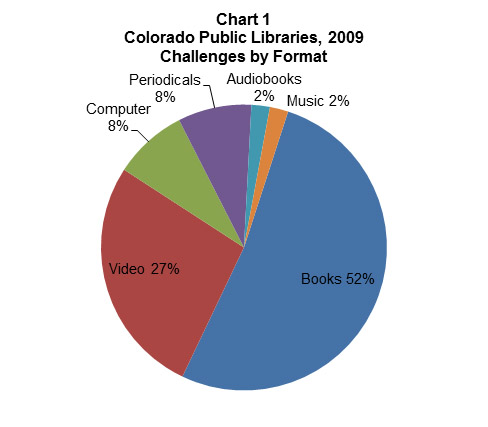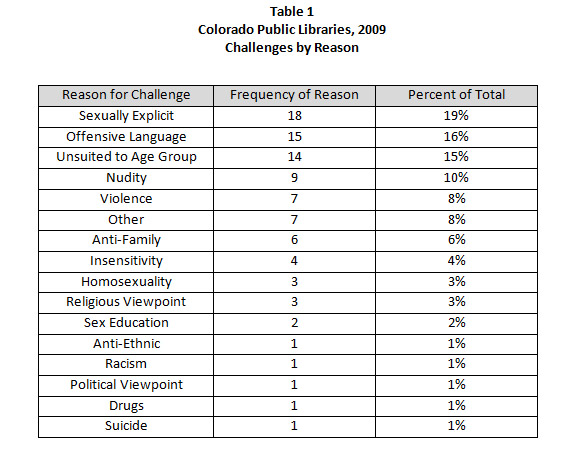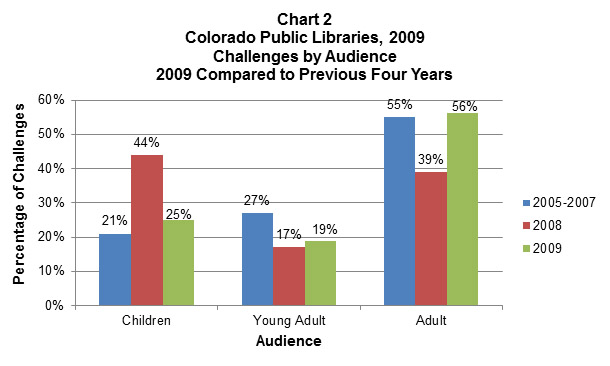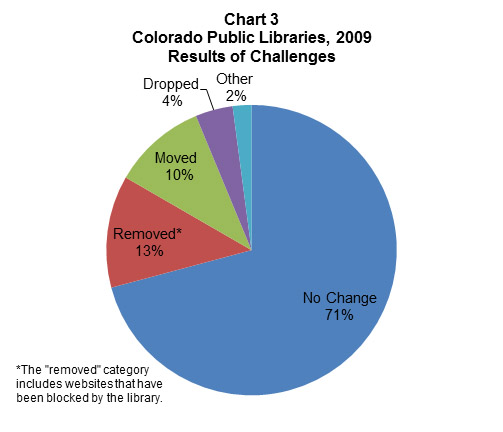As part of the Public Library Annual Report administered by the Library Research Service, Colorado public libraries indicate whether they have received challenges to their materials or services. In 2009, 20 of the 115 public libraries in the state reported at least 1 challenge. Nineteen of the libraries completed a follow-up survey to provide more details about those challenges.
In total, Colorado public libraries reported 48 challenges in 2009, the lowest number in more than a decade. No title was challenged more than once, and just one of the Colorado challenges (And Tango Makes Three by Justin Richardson) appeared on the American Library Association’s list of top 10 most frequently challenged books of 2009.
The American Library Association defines a challenge as “an attempt to remove or restrict materials, based upon the objections of a person or group. Challenges do not simply involve a person expressing a point of view; rather they are an attempt to remove material from the curriculum or library, thereby restricting the access of others.”
In 2009, Colorado public libraries reported the fewest challenges in more than a decade.
Formats Challenged
Although books and videos account for a lower percentage of total challenges than in previous years, they continue to be the most challenged formats, with books accounting for 1 out of 2 challenges (52%) and videos 1 out of 4 (27%). Challenges to periodicals and computer services increased from previous years, rising from 3 percent in 2008 to 8 percent in 2009 (see Chart 1).
Audience
The target audiences of challenged materials have varied over the last few years. In 2009, well over half (56%) of challenged materials were aimed at adults, while a quarter were directed at children. The previous year, challenges to children’s materials spiked to 44 percent, but challenges in 2009 (25%) were closer to the average from previous years. Challenges to adult materials in 2008 were also unusual compared to previous years with a notable dip (39%), although the 2009 and 2005-2007 percentages were nearly identical. In contrast, the percentage of challenges to young adult materials in 2009 was more consistent with the previous year, coming close to 1 in 5 (19%) (see Chart 2).
The drastic increase in challenges to children’s materials in 2008 likely is a result of multiple challenges to three different books: Little Monkey’s Peeing Circus by Tjibbe Veldkamp, Mommy Laid an Egg: Or, Where Do Babies Come From? by Babette Cole, and Uncle Bobby’s Wedding by Sarah Brannen. These 3 items—the latter of which appeared on ALA’s 2008 list of top 10 most challenged books—constituted a third of the Colorado challenges to children’s materials in 2008. The 2009 challenges did not reveal any items that resulted in such widespread objections.
Results/Actions Taken
Seven out of 10 challenges (71%) resulted in no change in the item’s status at the library, compared to almost 9 out of 10 (88%) with no change in 2008. The percentage of challenges not pursued by the patron beyond the initial complaint stayed about the same as the previous year, but that of items removed from the collection or moved to another area of the library increased substantially, from 1 and 4 percent, respectively, in 2008 to 13 and 10 percent in 2009 (see Chart 3). The reason for these increases could be recoding of survey responses. For example, some entries reported the result of the challenge as “other,” then explained that a book was reclassified in the adult, rather than young adult, section of the library. Such a response was re-coded as “moved.” Reasons for the notable decrease in challenges resulting in “no change” are unclear.
Reason for Challenge
The top 3 reasons for challenges in 2009 were the same as in 2008: sexually explicit (19%), offensive language (16%), and unsuited to age group (15%). Since LRS began conducting the follow-up survey, these reasons have been consistently cited among the most common criticisms. Challenges based on complaints of nudity dropped from nearly 1 in 5 (19%) in 2008 to just 1 in 10 in 2009, and objections to the portrayal of homosexuality in library materials also decreased, from 1 out of 10 (11%) to just 1 in 30 (3%).
- Visit the Colorado Association of Libraries Intellectual Freedom Committee website: http://cal-webs.org/committees6.html
- Visit the American Library Association Office of Intellectual Freedom (OIF) website: http://www.ala.org/ala/aboutala/offices/oif/index.cfm
- Visit the American Library Association OIF “Banned and Challenged Books” page: http://www.ala.org/ala/issuesadvocacy/banned/index.cfm

